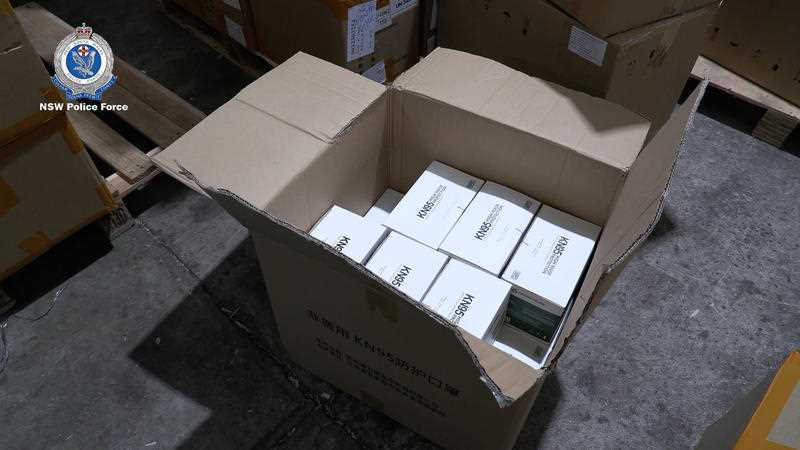A man accused of stealing 42,000 rapid antigen tests and boxes of face masks has received bail in Sydney after turning himself in following a police raid on storage units in the city’s south.
The supplies, worth at least $500,000, were uncovered in two Rosebery storage units on Wednesday afternoon about 24 hours after going missing from a Botany freight depot.
Images released by police on Thursday show dozens of boxes of the Chinese-made tests and KN95 face masks inside one of the units, however police were not able to say whether all 42,000 of the tests have been recovered.
Zeshi Wu, 28, attended Mascot police station on Wednesday night and was charged with dishonestly obtaining property by deception.
He appeared in Central Local Court on Thursday where he received bail.
Police allege he played a part in organising the theft.
NSW Police acting Superintendent Brendan Gorman said a “first-rate” investigation resulted in “a very swift resolution of this matter”, although police inquiries are ongoing.
It’s understood depot workers may have been tricked into allowing the tests to leave the facility with false documentation provided by someone impersonating a courier.
“There’s obviously some documentation (that) has had to be provided at that import facility, that documentation that has been provided is part of the investigation and will be before the court.”
The tests were privately imported, rather than the state-purchased tests bound for schools, aged care and vulnerable communities.
Supt Gorman said police allege the tests were to be sold on the street amid high demand and scarcity and there’s concern this won’t be the last investigation into stolen rapid antigen tests they will have to conduct.
“There is always those that will try and profit on the misery or the illnesses of others,” Supt Gorman said.
He says police will seek to release any seized tests back to their importer as quickly as possible after forensic examination so they can reach their intended destination.
Australian National University emeritus criminology professor Roderic Broadhurst told AAP a squeeze on supply creates opportunities for criminal entrepreneurs, whose most difficult task is obtaining supply rather than distributing it.
“They’ve already got a contraband logistical arrangement, they may not even have to go to a great deal of elaboration” to offload products on the black market, Professor Broadhurst says.
Earlier in the pandemic, dark web marketplaces were trafficking in protective equipment and dubious vaccines, later moving into things like vaccine certificates, though Prof Broadhurst notes entrepreneurial criminals aren’t just cashing in on COVID-19.
“It’s anywhere we’ve got supply (issues),” he says.
“The golden rule is crime follows opportunity, when there’s a gap in the market to exploit, it will be (exploited) by somebody.”
Three men arrested at the storage unit on Wednesday were released from custody after being interviewed and providing some further information to police.
The theft comes amid a nationwide shortage of the kits and some retailers charging exorbitant prices.
Australian Competition and Consumer Commission boss Rod Sims says the agency has received reports of RATs costing up to $500 for two tests through online marketplaces, and more than $70 per test through convenience stores, service stations and independent supermarkets.
Despite wholesale RAT costs being up to $11.45 a test, the agency said prices for the kits are often retailing between $20-$30 and are priced much higher through smaller outlets.
The Therapeutic Goods Administration is also investigating some businesses found breaking up packs of multiple RATs so each test can be sold individually at a higher price.
Get all the latest Canberra news, sport, entertainment, lifestyle, competitions and more delivered straight to your inbox with the Canberra Daily Daily Newsletter. Sign up here.



